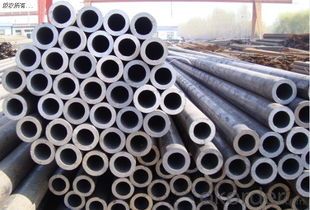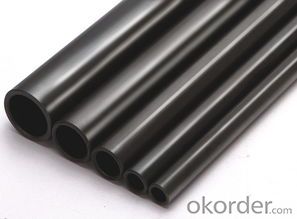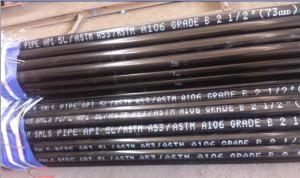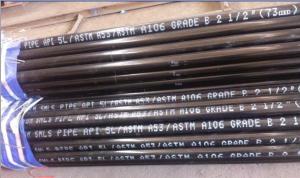API 5L Seamless Carbon Steel Pipe for Oiling Application
- Loading Port:
- Tianjin
- Payment Terms:
- TT OR LC
- Min Order Qty:
- 25 m.t.
- Supply Capability:
- 1000 m.t./month
OKorder Service Pledge
OKorder Financial Service
You Might Also Like
Product Description:
1、Structure of API 5L Seamless Carbon Steel Pipe for Oiling Application:
Seamless pipe is formed by drawing a solid billet over a piercing rod to create the hollow shell. As the manufacturing process does not include any welding, seamless pipes are perceived to be stronger and more reliable. Historically seamless pipe was regarded as withstanding pressure better than other types, and was often more easily available than welded pipe.
2、Main Features of API 5L Seamless Carbon Steel Pipe for Oiling Application:
• High manufacturing accuracy
• High strength
• Small inertia resistance
• Strong heat dissipation ability
• Good visual effect
• Reasonable price
3、API 5L Seamless Carbon Steel Pipe for Oiling Application Images:


Packaging & Delivery
Packaging Details: | seaworthy package,bundles wrapped with strong steel strip |
Delivery Detail: | 15-30days after received 30%TT |
4、API 5L Seamless Carbon Steel Pipe for Oiling Application Specification:
Standard | GB, DIN, ASTM |
Grade | 10#-45#, 16Mn |
Thickness | 8 - 33 mm |
Section Shape | Round |
Outer Diameter | 133 - 219 mm |
Place of Origin | Shandong, China (Mainland) |
Secondary Or Not | Non-secondary |
Application | Hydraulic Pipe |
Technique | Cold Drawn |
Certification | API |
Surface Treatment | factory state or painted black |
Special Pipe | API Pipe |
Alloy Or Not | Non-alloy |
Length | 5-12M |
Outer Diameter | 21.3-610mm |
Grade | 20#, 45#, Q345, API J55, API K55, API L80, API N80, API P110, A53B |
Standard | ASME, ASTM |
1.Material:20#(ASTM A 106/A53 GRB.API5LGRB,GB),45#,16Mn,10#.
2.Specification range:OD:21.3-610mm,WT:6-70mm,length:6-12m or according to the requirement of clients.
3.Excutive standards:GB,ASME API5L.ASTM A 106/A53,Despite of the above standards,we can also supply seamless steel pipe with standard of DIN,JIS,and so on,and also develop new products according to the requirements of our clients!
4.Surface:black lacquered,varnish coating or galvanized.
5.Ends:Beveled or square cut,plastic capped,painted.
6.Packing:bundles wrapped with strong steel strip,seaworthy packing.
5、FAQ of API 5L Seamless Carbon Steel Pipe for Oiling Application:
①How is the quality of your products?
Our products are manufactured strictly according to national and internaional standard, and we take a test
on every pipe before delivered out. If you want see our quality certifications and all kinds of testing report, please just ask us for it.
Guaranteed: If products’ quality don’t accord to discription as we give or the promise before you place order, we promise 100% refund.
②How about price?
Yes, we are factory and be able to give you lowest price below market one, and we have a policy that “ for saving time and absolutely honest business attitude, we quote as lowest as possible for any customer, and discount can be given according to quantity”,if you like bargain and factory price is not low enough as you think, just don’t waste your time.Please trust the quotation we would give you, it is professional one.
③Why should you chose us?
Chose happens because of quality, then price, We can give you both.Additionally, we can also offer professional products inquiry, products knowledge train(for agents), smooth goods delivery, exellent customer solution proposals.Our service formula: good quality+good price+good service=customer’s trust
SGS test is available, customer inspection before shipping is welcome, third party inspection is no problem.
Any question, pls feel free to contact us !
- Q:What are the limitations of using steel pipes?
- There are several limitations to using steel pipes in various applications. Firstly, steel pipes can be quite expensive compared to other materials such as plastic or copper. This cost factor can be a significant limitation for projects with tight budgets. Secondly, steel pipes are susceptible to corrosion. Over time, exposure to moisture and certain chemicals can cause steel pipes to rust and deteriorate. This can lead to leaks, reduced structural integrity, and ultimately, the need for costly repairs or replacement. Another limitation of steel pipes is their weight and rigidity. Steel pipes are generally heavier and less flexible than other types of pipes, making them more challenging to install and maneuver in certain settings. Additionally, their rigid nature makes them less suitable for applications that require significant movement or flexibility. Furthermore, steel pipes can be prone to thermal expansion and contraction. When exposed to extreme temperatures, steel pipes can expand or contract, potentially causing stress on joints, fittings, or other components. This can lead to leaks or even pipe failure if not properly accounted for. Lastly, steel pipes are not as resistant to certain chemicals or substances as other materials. Some chemicals can corrode or erode the inner lining of steel pipes, compromising their integrity and potentially causing contamination or leakage. While steel pipes have many advantages, it is important to consider these limitations when deciding on the most suitable material for a specific application.
- Q:What are the advantages of using steel pipes in the manufacturing of storage tanks?
- There are several advantages of using steel pipes in the manufacturing of storage tanks. Firstly, steel pipes are known for their strength and durability, making them suitable for holding large volumes of liquids or gases. They can withstand high pressure and extreme weather conditions, ensuring the longevity of the storage tank. Additionally, steel pipes are resistant to corrosion, which is crucial for preventing leaks or contamination of the stored materials. Moreover, steel pipes can be easily welded, allowing for efficient and precise construction of storage tanks. Finally, steel pipes have a high recyclability rate, making them an environmentally friendly choice for storage tank manufacturing.
- Q:What is the difference between steel pipe and tubing?
- Steel pipe and tubing serve various purposes, but they possess distinct dissimilarities. The fundamental distinction between them stems from their shape and dimensions. Steel pipe, ordinarily circular in shape, features a hollow interior. It is manufactured in a range of sizes and thicknesses to accommodate diverse pressure and temperature prerequisites. Steel pipe frequently finds employment in construction, plumbing, and the oil and gas industries for the conveyance of fluids or gases. Conversely, steel tubing can adopt a variety of shapes, such as circular, square, and rectangular. Unlike steel pipe, tubing is typically evaluated by its outer diameter and wall thickness. Structural applications, such as building frames, automotive components, and machinery, often employ steel tubing. Another divergence between steel pipe and tubing lies in their manufacturing processes. Steel pipe is typically fashioned from solid steel billets, which are heated and stretched to produce a seamless or welded tube. On the other hand, tubing can be generated through diverse methods, including hot or cold rolling, welding, or extrusion. In terms of strength and durability, both steel pipe and tubing offer excellent qualities. Nevertheless, the particular requirements of the application will dictate which one is more suitable. Steel pipe is frequently selected for high-pressure or high-temperature applications, whereas steel tubing is favored for structural purposes or when a specific shape is necessary. In summary, the primary disparity between steel pipe and tubing resides in their shape, measurement techniques, and manufacturing procedures. While steel pipe possesses a round shape and is measured by its inner diameter, tubing can adopt various shapes and is usually measured by its outer diameter. Both steel pipe and tubing find extensive use in diverse industries, but the choice depends on the specific application and requirements.
- Q:Are steel pipes suitable for underground gas distribution?
- Yes, steel pipes are suitable for underground gas distribution. They have a high tensile strength, corrosion resistance, and can withstand extreme temperatures, making them an ideal choice for transporting natural gas underground. Additionally, steel pipes are durable and have a long lifespan, making them a reliable option for gas distribution systems.
- Q:What are the advantages of using steel pipes in the mining industry?
- One of the key advantages of using steel pipes in the mining industry is their exceptional strength and durability. Steel pipes can withstand high-pressure environments, heavy loads, and harsh conditions commonly found in mining operations. Additionally, steel pipes are resistant to corrosion, which is vital in mining where water and other chemicals are often present. Moreover, steel pipes offer excellent thermal conductivity, allowing for efficient transportation of fluids, such as water or slurry, crucial for mining processes. Lastly, steel pipes are relatively easy to install and maintain, making them a preferred choice for mining projects.
- Q:What is the cost of steel pipes compared to other piping materials?
- The cost of steel pipes can vary based on factors like size, grade, and specifications, as well as market conditions and location. Generally, steel pipes are more expensive than materials like PVC or HDPE. However, when compared to materials like copper or stainless steel, steel pipes can often be more cost-effective. Steel pipes are known for their durability, strength, and resistance to high pressures and temperatures, making them suitable for various applications such as oil and gas pipelines, plumbing systems, and structural supports. Their longevity and reliability can offset the initial higher cost, as they require less maintenance and have a longer lifespan than other materials. Moreover, steel pipes are readily available in different sizes and grades, making them versatile and adaptable to different project requirements. This availability and versatility contribute to their cost-effectiveness, as they can be easily sourced and customized to specific needs. It is important to consider that prices for steel pipes can fluctuate due to market conditions and factors like raw material costs, transportation expenses, and labor charges. Therefore, it is advisable to consult with suppliers or industry experts for accurate pricing information based on specific project specifications and market conditions.
- Q:Is the same specification seamless steel pipe more expensive than welded pipe?
- Welded steel pipe refers to the use of steel or steel plate bending deformation into a round, square and other shapes after welding into the surface of the joint of the steel pipe. The blank used in welded steel pipe is steel or strip steel.
- Q:How are steel pipes used in the manufacturing of pulp and paper mills?
- Steel pipes are commonly used in the manufacturing of pulp and paper mills for various purposes such as transporting water, steam, chemicals, and other fluids throughout the facility. These pipes provide a durable and reliable solution for conveying materials and ensuring efficient operations in the pulp and paper industry.
- Q:Stainless steel tube, also known as why tube?
- According to the end of the pipe can be divided into light pipe and wire tubeThe tube can be divided into ordinary tube and special thread tube
- Q:How are steel pipes used in wastewater treatment?
- The wastewater treatment process relies heavily on the use of steel pipes. These pipes are crucial for the transportation and distribution of wastewater from various sources to the treatment facilities. The decision to use steel pipes is primarily based on their durability, strength, and resistance to corrosion. Within wastewater treatment plants, steel pipes are commonly applied for multiple purposes. Firstly, they are utilized for the intake of raw wastewater. These pipes are typically designed with a large diameter to accommodate the high flow rate of incoming wastewater. Due to their ability to withstand the pressure and turbulence caused by the wastewater flow, steel pipes are an ideal choice for this task. Once inside the treatment facility, steel pipes are responsible for the transportation of the wastewater to different treatment processes. They serve as connectors between various units, such as screens, grit chambers, sedimentation tanks, and biological reactors. Steel pipes are preferred for these applications because they can handle the corrosive elements present in wastewater, including chemicals, acids, and gases. Moreover, their durability ensures a long-lasting service life, resulting in reduced maintenance and replacement costs. Steel pipes also play a significant role in the distribution of treated water during the wastewater treatment process. After the wastewater has undergone treatment, it goes through disinfection and other processes to eliminate harmful contaminants. The treated water is then distributed through steel pipes, allowing it to be reused for purposes such as irrigation, industrial processes, or discharged back into water bodies. Furthermore, steel pipes are employed in the construction of wastewater treatment infrastructure. They are used in the installation of underground sewer lines, pumping stations, and manholes. Steel pipes provide the necessary strength and stability to withstand external forces like the weight of the soil. To summarize, steel pipes are crucial components in the wastewater treatment process. They are responsible for the transportation and distribution of wastewater, connecting different treatment units, and distributing treated water. Their durability, resistance to corrosion, and ability to handle high-pressure flows make them an excellent choice for this demanding application.
1. Manufacturer Overview |
|
|---|---|
| Location | |
| Year Established | |
| Annual Output Value | |
| Main Markets | |
| Company Certifications | |
2. Manufacturer Certificates |
|
|---|---|
| a) Certification Name | |
| Range | |
| Reference | |
| Validity Period | |
3. Manufacturer Capability |
|
|---|---|
| a)Trade Capacity | |
| Nearest Port | |
| Export Percentage | |
| No.of Employees in Trade Department | |
| Language Spoken: | |
| b)Factory Information | |
| Factory Size: | |
| No. of Production Lines | |
| Contract Manufacturing | |
| Product Price Range | |
Send your message to us
API 5L Seamless Carbon Steel Pipe for Oiling Application
- Loading Port:
- Tianjin
- Payment Terms:
- TT OR LC
- Min Order Qty:
- 25 m.t.
- Supply Capability:
- 1000 m.t./month
OKorder Service Pledge
OKorder Financial Service
Similar products
New products
Hot products
Related keywords





























